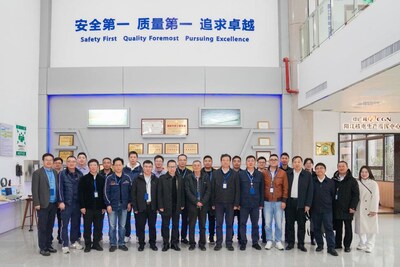5G Private Network Enables Digital Transformation of Yangjiang Nuclear Power and Takes Productivity to New Heights
BEIJING, Nov. 13, 2024 /PRNewswire/ -- Nuclear power is a source of clean energy. China has entered the fast track in this field. In 2023, China's electricity generation from nuclear energy reached 433.371 billion kWh, accounting for 4.86% of China's total energy yield. Yangjiang Nuclear Power contributed 53.188 billion kWh in 2023, accounting for 12.3% of China's nuclear power generation. The robust development of nuclear power is accelerating our country's goal of achieving green and sustainable energy development.

For nuclear power plants, security and quality are the top priority. To develop new forms of productivity, Yangjiang Nuclear Power faces three pain points: difficult collaboration in production, difficult overhaul management and control, and difficult device monitoring. To address these issues and meet the core requirements of security and performance improvement, Yangjiang Nuclear Power is determined to carry out a digital transformation. Yangjiang Nuclear Power, China Telecom, and Huawei have jointly built a 5G converged private network that integrates data, voice, SMS, trunking, and narrowband (NB) communications capabilities.
1. The 5G private network for nuclear power runs independently and is always connected. A new network architecture is designed with dedicated base stations, multi-frequency networking, and a full set of 5GC active-active solutions. The satellite communications and existing communications systems of Yangjiang Nuclear Power are also integrated to offer an always-connected network for multiple purposes, ensuring the security of nuclear power production. 2. New technologies such as 5G-A positioning and RedCap are used to support high-precision positioning of personnel, and data and video communications with low power consumption. The communications network adapts to complex environments such as radiation areas, confined spaces, and sea areas of the nuclear power plant. Industry-leading new devices and techniques are used to test the radiation, vibration, and wind resistance as well as electromagnetic compatibility of devices and upgrade them. These help resolve data communications issues in nuclear power environments. The 5G network covers six generator sets, over 10,000 personnel, and over 10,000 terminals. Since the deployment, it has significantly enhanced the digital capability of Yangjiang Nuclear Power, facilitating its intrinsic security and improving its performance.
1. The digital and intelligent upgrade of the production chain improves efficiency. Over 1700 mobile terminals have been deployed for paperless office, avoiding the manual pasting of over 700,000 labels and human-caused risks. Mobile operations reduced 2150 labor hours. Collaborative operations removed 55 coordination engineering positions. AI-based supervision helped identify over 200 operation risks and non-standard devices over 50 times. 2. Real-time interconnection for overhaul improves quality of the processes and ensures security. The overhaul period of a single generator set has been reduced by 2 days through the digital process, temporary alert deployment, and interconnection. The decision-making efficiency has been improved by 21.4% through 5G and AI. Real-time radiation dose measurement for individuals is the first trial in China, and has already helped more than 10 times in identifying people with health risks. 3. Device status sensing and prediction improve reliability. Based on intelligent device sensing, unified management, and integrated monitoring, 1170 intelligent device monitoring and warning models have been established. The number of critical defects of major devices decreased by 6.47%, and the number of internal operation events/line operation events in the operation fields decreased by 13.86% year-on-year. The project aims to build the first benchmark for intelligent nuclear power construction empowered by 5G technologies in China, and establish a nuclear power system that focuses on security, reliability, green and efficient development, intelligent economy, and digital future. 5G technologies are used to digitally innovate the existing production scenarios of Yangjiang Nuclear Power, improve the intrinsic security level of nuclear power production, improve the reliability of device operations and the timeliness of data collection and analysis, build the ubiquitous power IoT, and promote the high-quality development of the nuclear power industry.
Along with the outbreak of the global energy crisis and surging demand for clean energy, nuclear power has become the strategic goal of major global economies. The number of nuclear power generator sets in operation and under construction in China ranks No. 1 in the world, accounting for 5% of our country's total generator sets. There is still tremendous potential for further development as this proportion is much lower than France's 75%. In addition, digital enablement plays a crucial role in promoting the high-quality development of nuclear power. As the core element of the information foundation, 5G can be used in numerous scenarios. With the rapid development of China's nuclear power industry, the integration of "5G + digital nuclear power" will become popular both domestically and globally. In this vast world, "5G + digital nuclear power" has a promising future.

Photo -  Photo -
Photo - 
CONTACT: Hua Zhang, zhanghua111@chinatelecom.cn
Andere persberichten of expertquotes van deze organisatie:

Dit is een origineel bericht van PR Newswire
Ga naar alle berichten van deze organisatie.
